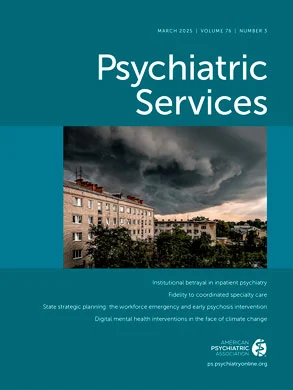In a recovery-oriented system in the 21st century, what should social integration of people with serious mental illness look like? If the goal of integration transcends the use of community services and supports, how close is the goal of full social inclusion? In the introduction to a special section in this issue, Robert A. Rosenheck, M.D., who served as guest editor, notes, “There is both good news and bad news, but the highest hopes seem to have been disappointed” (
page 425). The special section includes five research reports and two commentaries. In the first report, Jack Tsai, Ph.D., and colleagues present data from a supported housing program for chronically homeless adults in 11 communities. Participants made substantial gains in housing stability, but improvements in quality of life and community participation were limited (
page 427). In the second study, Joy Noel Baumgartner, Ph.D., M.S.S.W, and Daniel B. Herman, Ph.D., used critical time intervention to promote community integration of formerly homeless adults after hospital discharge. Participants experienced gains in housing and had fewer hospitalizations, but these outcomes were not associated with better social integration, which remained low (
page 435). In the third study, Philip T. Yanos, Ph.D., and colleagues found that formerly homeless clients who were living in supported housing in the Bronx had lower scores than other neighborhood residents on measures of physical integration, social integration, and citizenship (
page 438). In the fourth study, a group led by Michael Rowe, Ph.D., used community-based participatory research methods (focus groups and concept mapping) with 75 mental health service users to create an instrument that assesses domains of citizenship. The instrument can help practitioners design more targeted interventions to promote social integration (
page 445). In the final research report, Claire Henderson, M.D., Ph.D., and colleagues present data to show that England's Time to Change program, an antistigma marketing campaign, made progress in its first year toward the modest goal of a 5% reduction in discrimination. Service users reported significantly fewer instances of discrimination, particularly from family and friends (
page 451). In the first of two commentaries, James M. Mandiberg, Ph.D., argues that efforts to promote full social inclusion have failed and that an alternative approach is needed—one that views people in recovery as their own “identity community.” His approach to social inclusion, which is based on assumptions very different from those of traditional services, involves business incubators and social enterprises (
page 458). Finally, Kim Hopper, Ph.D., reviews the “mixed legacy” of supported housing, which despite its formidable achievements “still functions as an abeyance mechanism.” Progress will involve “reimagining the remit of supported housing” and confronting the purposes it serves (
page 461).

